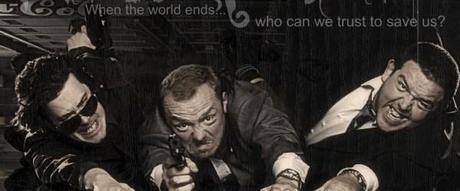Edgar Wright and Simon Pegg first started working together in 1996 on a British sketch comedy show called, Asylum. They would go on to make the British sitcom, Spaced, along with their newest buddy, Nick Frost. Spaced was a geek-oriented show with reference humor ranging from the subtle to the not-so-subtle. There really wouldn’t be another show like it for almost a decade when Community started on NBC (that’s probably not true, but I’m going to name check Community anyway *wink*)
This trio would later go on to create an awesome trilogy of subgenre subverting comedies (NOT PARODIES!) that would become affectionately called The 3 Flavours Cornetto Trilogy (or the Blood and Ice Cream Trilogy for Americans who don’t know what the hell a Cornetto is), an homage to Krzysztof Kieślowski’s Three Colours Trilogy. Like many thematic trilogies (quasi-sequels with no shared continuity), they tend to evolve and develop a theme rather than just redoing it over and over. With Edgar Wright’s trilogy, it seems to be a “overcoming subjugation” theme.
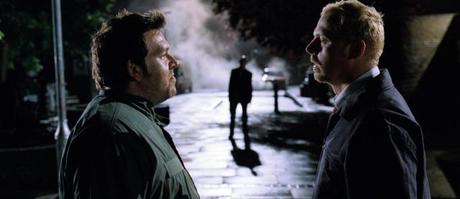
SPOILER WARNING FOR ALL THREE MOVIES
There first outing together was the zom-rom-com, Shaun of the Dead. Shaun (Simon Pegg) is an unmarried man in his early 30s sharing a house with 2 of his buddies with very little career track to speak of. His girlfriend, Liz, is looking for some more grown-up fun, but Shaun is still stuck playing video games and going to the same pub every night. He is faced with 2 decisions: stay like his buddy, Ed (Nick Frost), layabout stoner-dealer with no job and no prospects, or become like his buddy Pete, a man with the kind of job that he can’t “sell a bit of weed” on the side or stay up all night when he has to work in the morning. The thing is, neither option is really that great. You are either an unhelpful sloth or a stressed out button-pusher. Unfortunately, after a certain age, this is the reality a lot of us face. I feel like I am feeling it right now. I remember a lot of people talking about following dreams in the 90s, but with my more formative years in the 2000s, the message is “get a job because social security will be gone by the time you need it.” Clearly, society at large wants you to think that “Pete” is the better choice.
Shaun staring his future in the face is interrupted by a zombie plague. Zombies, man! They creep me out. Undead people coming back to life to feed on the living, and that’s not even the scary part. The scary part is that the lights went out on all these people. They look like people (sort of). They are up and moving and making noises, but they are completely dead inside. For years, they have been used as a metaphor for the loss of identity and the loss of individualism. And that these losses come normally. Automatic without much reason or direction. Look at the events of Shaun of the Dead before the zombie infection. Shaun sits on the bus staring into space along with a bunch of other commuters. Same goes for the people walking in the streets and doing their menial tasks at work. When the infection starts, Shaun doesn’t even notice because he is so on auto-pilot for his routine morning walk to the corner store. This society that we have constructed where we develop habits and just go through the motions is dangerous to the individual. We are already so close to being zombies, we don’t need some big bad to set the fuse.
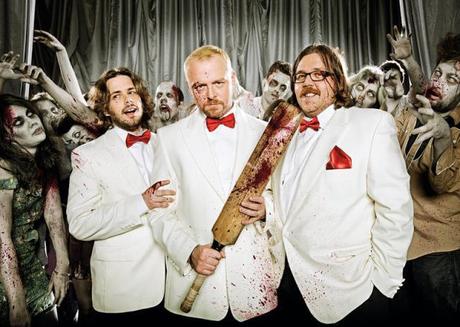
Even in the conclusion of the movie, where the zombie plague is under control, Shaun still just goes back to doing what he was normally doing. Video games with his buddy Ed and drinks at his favorite pub with his girlfriend, Liz, who has had enough excitement to last a lifetime. Shaun’s being more like the person he wants to be and having fun instead of being beaten down by a system that wants to make us into cogs in the big wheel, so that’s good, but if he makes habits out of all of these things, he runs the risk of zombifying himself all over again. It’s a vicious cycle.
There second feature together sees Simon Pegg playing a character who is the complete opposite of Shaun. He plays Nicholas Angel, a London police officer who is so great at his job that his superiors decided to transfer him because he is making everyone look bad. Angel is basically the kid in school who ruins the curve for everyone, and at the time, it makes sense to hate them for it. But when a powers-that-be stand-in says, “You are too good. We have to get rid of you,” it makes me weep for that society.
They transfer him to a small country town where nothing bad ever happens. Angel is teamed up with Nick Frost’s Danny Butterman, the simple minded action movie aficionado son of the man in charge, Inspector Butterman. The cops are pretty much oblivious to what is actually going on, but Angel’s keen skills of observation, when not hampered by Butterman’s antics, see the truth. A hooded man is targeting members of their small community like the tycoon with the obnoxiously big house or the skilled florist who was taking her talents elsewhere.
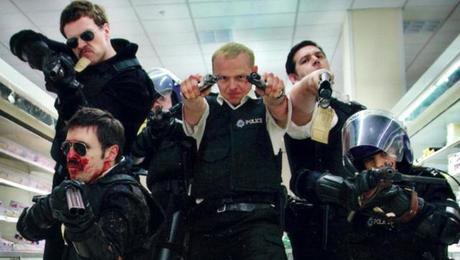
Let’s not beat around the bush (I did warn of spoilers), the killer is actually all of the members of the Neighborhood Watch as well as Inspector Butterman. They have been killing anyone who seeks to change their idyllic small town life: from living statues to obnoxious actors. These people aren’t really bad, they are just annoying, but the Watch thinks they can take matters into their own hand. Angel was kicked out of the city by a bunch of status quo micro-managers to find another much more extreme team of status quo micro-managers. These kinds of people put the needs of the many ahead of the needs of the individual in such a way that it damns the individuals.
This is a much scarier version of the zombification problem. While the zombie subjugation happens indirectly from simply being boring, the Neighborhood Watch’s subjugation is conscious and direct. They are deliberately punishing behavior they deem inappropriate going far beyond laws and accepted punishments. In the end, Angel saves the day, and when asked to come back to the city, which has gone to pot without him, he decides to stay in the small town. One could say he did it for more abstract reasons like finding a home and making friends, but there is no denying that Angel’s job would be much easier in a small town. The machinations are not as big or run as deep as they do in the city. It is far easier to make a difference than what amounts to the occasional band-aid in the big city. This is more of an ignorance is bliss solution though.
The World’s End
This is the trio’s third and final foray into genre-busting. It pits Gary King, an irresponsible modern day King Arthur played by Simon Pegg, on a quest to complete a bar crawl he never finished in high school. He is starting to feel over-the-hill and thinking his better days are behind him, so he scrounges up his estranged buddies to try it again. Among them is Nick Frost’s straight-laced sober living Andy. (It is notable that Pegg and Frost have changed places as the worrisome straightman and kooky burdensome friend). There is also Steven (Paddy Considine), a lonely contractor who always got the girls stolen from him by Gary, Oliver (Martin Freeman), a fast-talking real estate broker, and Peter (Eddie Marsan), a nebbish family man.
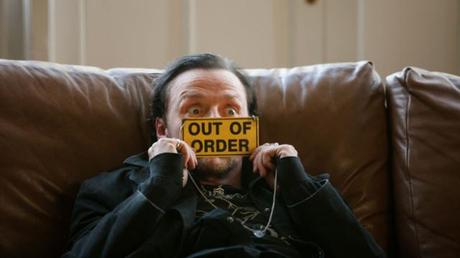
As they are going along on their pub crawl, they figure out that much of their hometown has been replaced by robot (for lack of a better word) doubles. They decided to continue on their way so as not to attract suspicion while also brainstorming about how to end the robots if it comes to that. They were created by an alien intelligence that sought to make Earth, a planet that must have looked like it was inhabited by monkeys with guns to them. It is the most Joss Whedon of the bunch. Whedon has always written about power-that-be style bad guys who sought to make people better by essentially stealing from them what made them human. It is also the only installment in Edgar Wright’s trilogy that directly deals with identity. Gary, Andy, and the rest of them actually discuss how they used to be vs. how they are now. How they have improved vs. how they got worse. What they wanted vs what they have.
In the end, they decide that being alcoholic jerks is part of what makes humanity great. Not literally. To be clear, they are talking about humanity’s ability to fail and grow as their most prominent characteristic. They annoy this alien intelligence so much that it decides to leave. It blows up the town and wipes out all the technology in the world, technology that it gifted to us, at the same time though. Now, the robot doubles of Oliver and Peter were able to get back to their happy uneventful lives, Andy was fixes his marriage, Steven finally gets the girl, and Gary gets to live like an epic hero in a post-apocalyptic world. In order for these guys to get what they wanted, to be the person they always wanted to be, they literally had to destroy society as we know it. It reminds me of a movie I had seen recently, Sparrows Dance, which took its title from a poem. “If someone would poke out the eyes of the hawks/We sparrows could dance wherever we please!” If it wasn’t for all these damn people, it would be a hell of a lot easier to be ourselves.
